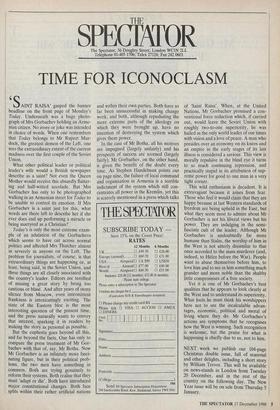The Spectator, 56 Doughty Street, London WC1N 2LL Telephone 01-405
1706; Telex 27124; Fax 242 0603
TIME FOR ICONOCLASM
AINT RAISA' gasped the banner headline on the front page of Monday's Today. Underneath was a huge photo- graph of Mrs Gorbachev holding an Arme- nian citizen. No irony or joke was intended in choice of words. When one remembers that Today belongs to Mr Rupert Mur- doch, the greatest demon of the Left, one sees the extraordinary extent of the current madness over the first couple of the Soviet Union.
What other political leader or political leader's wife would a British newspaper describe as a saint? Not even the Queen Mother would receive this absurdly flatter- ing and half-witted accolade. But Mrs Gorbachev has only to be photographed walking in an Armenian street for Today to be unable to control its emotion. If Mrs Gorbachev is a saint just for this, what words are there left to describe her if she ever does end up performing a miracle or being martyred as a Christian?
Today's is only the most extreme exam- ple of an adulation of the Gorbachevs which seems to have cut across normal politics and affected Mrs Thatcher almost as severely as anyone on the Left. The problem for journalists, of course, is that extraordinary things are happening or, at least, being said, in the Soviet Union, and these things are all closely associated with the country's leader. Editors are terrified of missing a great story by being too cautious or blasé. And after years of stony silence from Moscow, even intermittent frankness is intoxicatingly exciting. The state of the Eastern bloc is the most interesting question of the present time, and the press naturally wants to convey that interest, sparking it in readers by making the story as personal as possible.
But the euphoria goes beyond all this, and far beyond the facts. One has only to compare the press treatment of Mr Gor- bachev with that of, say, Mr Botha. Now Mr Gorbachev is an infinitely more fasci- nating figure, but in their political prob- lems, the two men have something in common. Both are trying genuinely to reform their systems. Both realise that they must 'adapt or die'. Both have introduced major constitutional changes. Both face splits within their rather artificial nations and within their own parties. Both have so far been unsuccessful in making change work; and both, although repudiating the more extreme parts of the ideology on which they were brought up, have no intention of destroying the system which gives them power. In the case of Mr Botha, all his motives are impugned (largely unfairly) and his prospects of success are scorned (largely fairly). Mr Gorbachev, on the other hand, is given the benefit of the doubt every time. As Stephen Handelman points out on page nine, the failure of local command and organisation in Armenia is a terrible indictment of the system which still con- centrates all power in the Kremlin, yet this is scarcely mentioned in a press which talks of 'Saint Raisa'. When, at the United Nations, Mr Gorbachev promised a con- ventional force reduction which, if carried out, would leave the Soviet Union with roughly two-to-one superiority, he was hailed as the only world leader of our times with vision and a love of peace. A man who presides over an economy on its knees and an empire in the early stages of its last illness is considered a saviour. This view is morally repulsive in the blind eye it turns to so much continuing repression, and practically stupid in its attribution of sup- reme power for good to one man in a very tight corner.
This wild enthusiasm is decadent. It is extravagant because it arises from fear. Those who feel it would claim that they are happy because at last Western standards of freedom are being upheld in the East, but what they seem most to admire about Mr Gorbachev is not his liberal views but his power. They are indulging in the semi- fascistic cult of the leader. Although Mr Gorbachev is undoubtedly far more humane than Stalin, the worship of him in the West is not utterly dissimilar to that once accorded to the mass murderer (and, indeed, to Hitler before the War). People want to abase themselves before him, to love him and to see in him something much grander and more noble than the shabby little compromises of a free society.
Yet it is one of Mr Gorbachev's best qualities that he appears to look clearly at the West and to understand its superiority. What fools he must think his worshippers here not to see the incalculable advan- tages, economic, political and moral of living where they do. Mr Gorbachev's actions are symptoms that he recognises how the West is winning. Such recognition is welcome, but the praise for what is happening is chiefly due to us, not to him.
NEXT week we publish our 104-page Christmas double issue, full of seasonal and other delights, including a short story by William Trevor. This will be available on news-stands in London from Tuesday 20 December, and in the rest of the country on the following day. The New Year issue will be on sale from Thursday 5 January.


























































 Previous page
Previous page